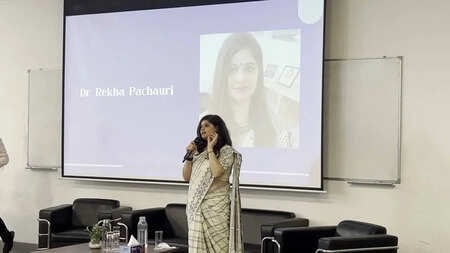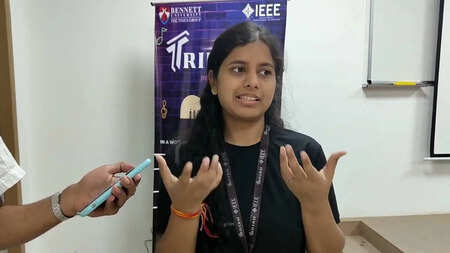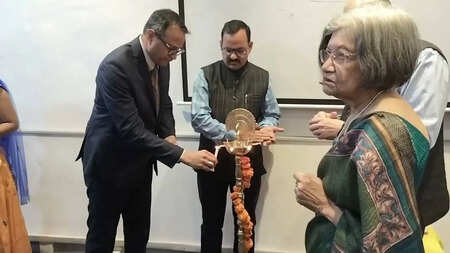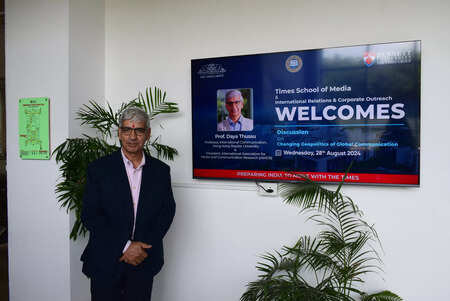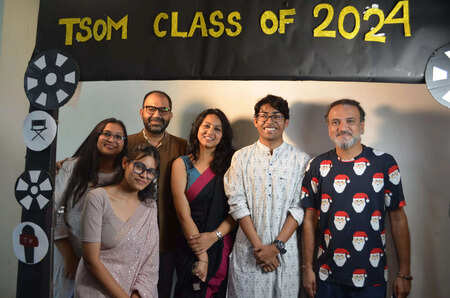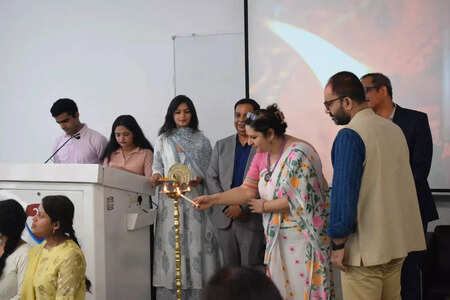Dowry deaths – The National Failure We Refuse To Confront
Times of Bennett | Updated: Sep 05, 2025 17:46

EDITORIAL
Correspondent- Ananya Barath
A week back, I was anointed the first-ever Editor-in-Chief of The Times of Bennett. My celebrations, however, lasted mere seconds as they were marred by a harrowing incident close to the campus - the brutalmurder of Greater Noida resident Nikki Bhati , allegedly for dowry . What should have been a personal milestone has instead become a stark reminder of the responsibility that comes with my role, to confront the ugliest truth our society still refuses to shed.
A 28-year-old’s dreams turned to ash because her worth was measured not by who she was, but by the riches she was expected to bring.Nikki Bhati is yet another name in a long, shameful list of women consumed by a custom our society pretends to have outgrown.
As a woman, I am filled with rage.Anger at the news, anger at the muted public reaction, but most importantly, anger that in 2025, I still have to write about a young woman being burned because of something as asinine as dowry.
As details spill out, I am losing my already weakening faith in humanity. Her husbandVipin objected to Nikki posting her reels on Instagram. He even got the panchayat involved! While this might look trivial, it's the larger issue of crushing her autonomy.
The irony is cruel. Nikki lived in Greater Noida, barely a stone’s throw from theKnowledge Park , surrounded by IT companies, universities, and the promise of life altering Education. At an age where learning is more vital than ever, Nikki’s world crashed to domestic limitations.

Home Ministry’s National Crime Records Bureau putsdowry deaths in 2022, to a whopping 6,450 – nearly 17 deaths a day, which is 25 times more than the number of women being raped and killed.
Alarmingly, these numbers are a fraction of the cases that have occurred. Of the 7,000 dowry deaths reported annually, only around 4,500 were booked. Behind every statistic I’ve been rattling off is an actual woman who had her future snatched away from her.
The Dowry Prohibition Act of 1961 criminalized the practice more than six decades ago providing for punishment in cases of dowry harassment and deaths. Yet, there seems to be no end to the brutalities.
Why? Laws are only as strong as the society that enforces them. And too often, families, neighbours, and even authorities choose silence over confrontation and collusion over justice.
Women have been drowned, their throats slit, heads battered with bricks, tortured by hot iron rods, pushed to suicide, set afire, and raped – all due to dowry. Yet the blind eye rules. How many more lives need to be snuffed before we realise this archaic cruelty isn’t all that archaic?

Sometimes it is blatant: A demand for cash, a new car, or property. Sometimes it is insidious: hypocrisy dressed up as gifts, tradition, or support for the couple’s future. Subtle or explicit, it is the same poison.
We call ourselves a progressive nation. We boast about our booming start-ups and revolutionary AI technology. We never tire of talking about how we’re going to shake up the system with our big ideas and bold visions. But what about dismantling traditions?
Where is “progress” when centuries-old brutalities continue to thrive behind closed doors, silenced by stigma and tradition? Where is progress when women become bargaining chips in a marketplace steeped in greed and misogyny? Where is progress when communities stay with the curse of complicity?
I am aware I write this from a position of privilege. I am lucky to be from a family that is progressive enough to not treat me like property bartered for marriage. But that, is telling too. Being treated with agency is no guarantee for women, just luck. Survival and security are gifted but only to a select few.

I am tired of silence, of the performative social media posts. Nikki deserved a life all her own, which for her was running her beauty parlour. Instead, her story has been drowned in headlines, outrage and denials. Until we confront not just the failure of our laws but the rot within our culture, this cycle of domestic violence will never end.
Under my editorship, The Times of Bennett will strive to spark conversations on such issues and raise uncomfortable questions that plague our campus, the nation and the world at large. I truly believe that students hold the power to ignite change and shape narratives. It is often the youth who become the conscience that confronts a society unwilling to plug its failings.
Ananya Barath is a second year BA Mass Communication student. With a brain wired to spot patterns and stories where others see chaos, she aims to turn observations into narratives that inform, inspire, and spark dialogue.
Correspondent- Ananya Barath
A week back, I was anointed the first-ever Editor-in-Chief of The Times of Bennett. My celebrations, however, lasted mere seconds as they were marred by a harrowing incident close to the campus - the brutal
A 28-year-old’s dreams turned to ash because her worth was measured not by who she was, but by the riches she was expected to bring.
As a woman, I am filled with rage.
As details spill out, I am losing my already weakening faith in humanity. Her husband
The irony is cruel. Nikki lived in Greater Noida, barely a stone’s throw from the

Home Ministry’s National Crime Records Bureau puts
Alarmingly, these numbers are a fraction of the cases that have occurred. Of the 7,000 dowry deaths reported annually, only around 4,500 were booked. Behind every statistic I’ve been rattling off is an actual woman who had her future snatched away from her.
The Dowry Prohibition Act of 1961 criminalized the practice more than six decades ago providing for punishment in cases of dowry harassment and deaths. Yet, there seems to be no end to the brutalities.
Why? Laws are only as strong as the society that enforces them. And too often, families, neighbours, and even authorities choose silence over confrontation and collusion over justice.
Women have been drowned, their throats slit, heads battered with bricks, tortured by hot iron rods, pushed to suicide, set afire, and raped – all due to dowry. Yet the blind eye rules. How many more lives need to be snuffed before we realise this archaic cruelty isn’t all that archaic?

Sometimes it is blatant: A demand for cash, a new car, or property. Sometimes it is insidious: hypocrisy dressed up as gifts, tradition, or support for the couple’s future. Subtle or explicit, it is the same poison.
We call ourselves a progressive nation. We boast about our booming start-ups and revolutionary AI technology. We never tire of talking about how we’re going to shake up the system with our big ideas and bold visions. But what about dismantling traditions?
Where is “progress” when centuries-old brutalities continue to thrive behind closed doors, silenced by stigma and tradition? Where is progress when women become bargaining chips in a marketplace steeped in greed and misogyny? Where is progress when communities stay with the curse of complicity?
I am aware I write this from a position of privilege. I am lucky to be from a family that is progressive enough to not treat me like property bartered for marriage. But that, is telling too. Being treated with agency is no guarantee for women, just luck. Survival and security are gifted but only to a select few.

I am tired of silence, of the performative social media posts. Nikki deserved a life all her own, which for her was running her beauty parlour. Instead, her story has been drowned in headlines, outrage and denials. Until we confront not just the failure of our laws but the rot within our culture, this cycle of domestic violence will never end.
Under my editorship, The Times of Bennett will strive to spark conversations on such issues and raise uncomfortable questions that plague our campus, the nation and the world at large. I truly believe that students hold the power to ignite change and shape narratives. It is often the youth who become the conscience that confronts a society unwilling to plug its failings.
Ananya Barath is a second year BA Mass Communication student. With a brain wired to spot patterns and stories where others see chaos, she aims to turn observations into narratives that inform, inspire, and spark dialogue.


